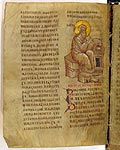Gospel Complete Aprakos.
1463. Pskov. Scribe: Boris Tveritin
F (270 ı 198). 169 +IV leaves.
Parchment and paper. Ink, cinnabar, colours, gold.
It is written in a uncial hand in two columns.
The illumination of the manuscript includes a miniature of the Acts of the Apostle Matthew (fol. 19), initials with motifs in the South Slavic and the Old Byzantine styles in paints and cinnabar.
Folios 168v-169r bears the scribe's inscription stating that the work was finished on 13 July 1463. It also notes that the manuscript was comissioned by churchwardens of the Annunciation Cathedral (which was located on the territory of the Pskov Kremlin) Jacov Ivanovich and Gavrila Mikulenich for the side-chapel of the Holy Trinity Cathedral, in the time of Grand Duke Ivan III Vasilevich, Archbishop of Novgorod Iona, Prince of Pskov Ivan Alexandrovich, Mayors of Novgorod and Pskov Yuri Timofeyevich and Zinovi Mikhailovich, Priest Ankindin, Deacon Lavrenti. The scribe left his name and nickname - Boris Shestnik Tveritin.
The only miniature in the book is placed within the column of text (a type of decoration occurs in Novgorod manuscripts). This rare feature, differing from the typical presentation of such pictures on a single leaf, as well as the fact that only few examples of Pskov illuminated manuscripts have survived, makes the codex unique. The manuscript was completed in the year that became the turning point in the history of the city. Pskov chronicles state that a serious threat of war to the city arose from the direction of Germany in 1463. The veche (the popular assembly) was summoned, and Mayor of Pskov Zinovi and boyars (noblemen) elected voevode (commander) and ambassadors to Grand Duke Ivan III. Despite the fact that Ivan III kept the Pskov ambassadors in the entrance hall of his palace for three days, wishing to punish Pskov citizens for their rebelliousness - the banishment of the former Pskov governor Vladimir from the city; finally, he came to the realization that alliance with the city had many advantages. Ivan III placed the other governor - Prince Ivan Alexandrovich of Zvenigorod in Pskov to rule on his benefit. Prince Ivan, very likely, with a military reinforcement was sent immediately to Pskov, and arrived there in the same year of 1463. Then the chronicles say that Germans "asked humbly for peace" and peace was made with them by the veche, and while accepting the post of Prince of Pskov, Ivan Alexandrovich kissed a cross, by tradition, at the the Holy Trinity Cathedral to show faithfulness to Pskov citizens. Hence, persons, mentioned in a record of Scribe Boris, played important roles in the history of Pskov.
In 1852 the manuscript came into the Imperial Public Library along with the other contents of the Mikhail Pogodin's collection.
Shelfmark: –Õ¡. œÓ„Ó‰. 18.





